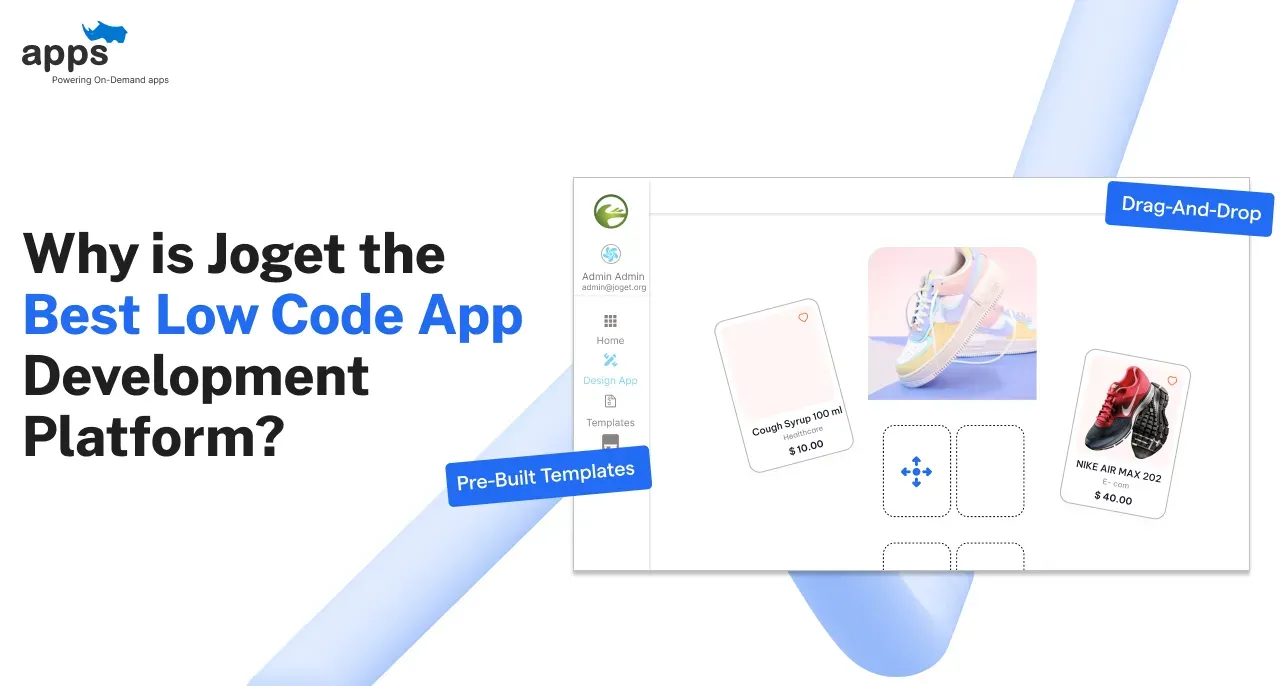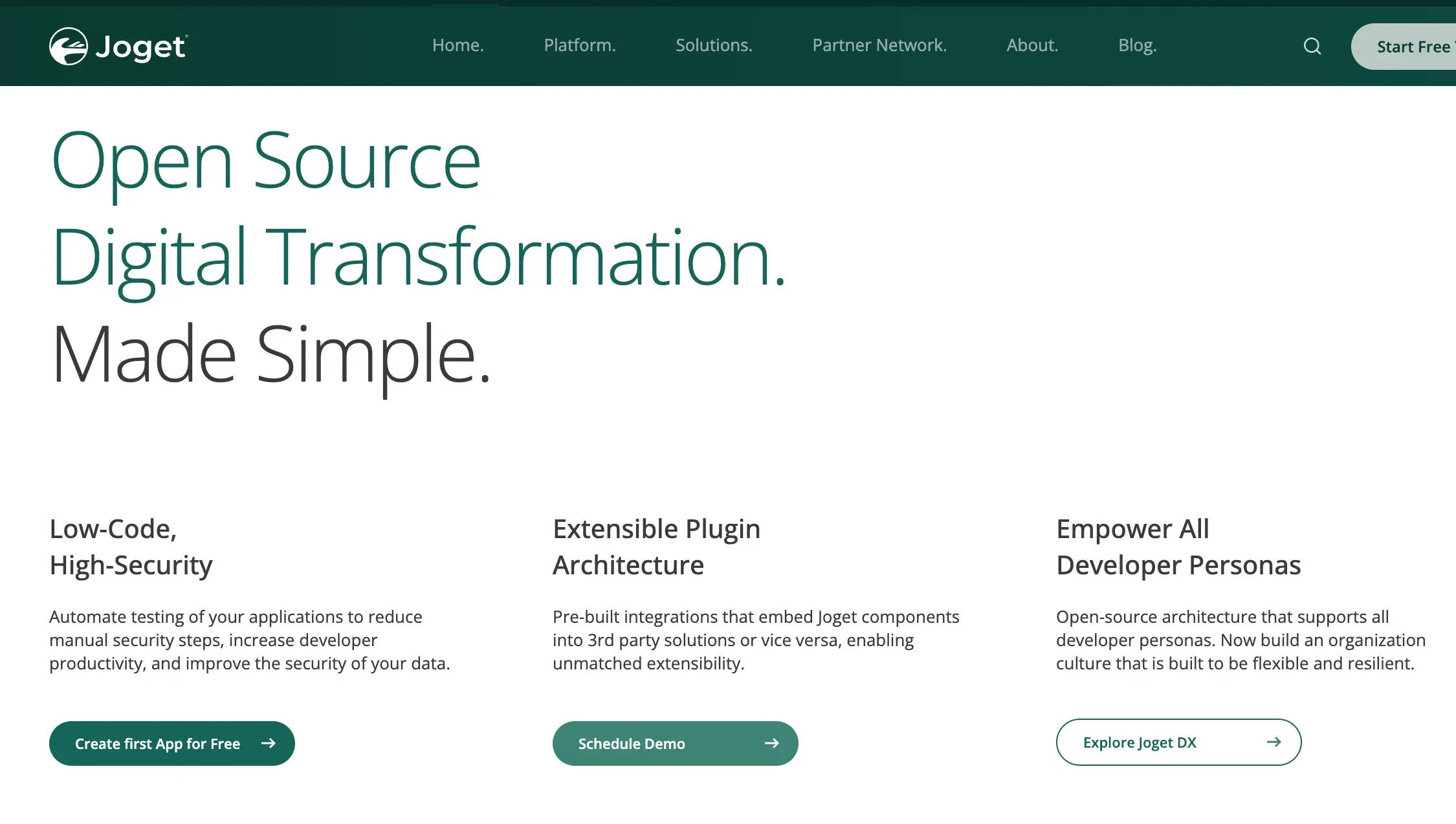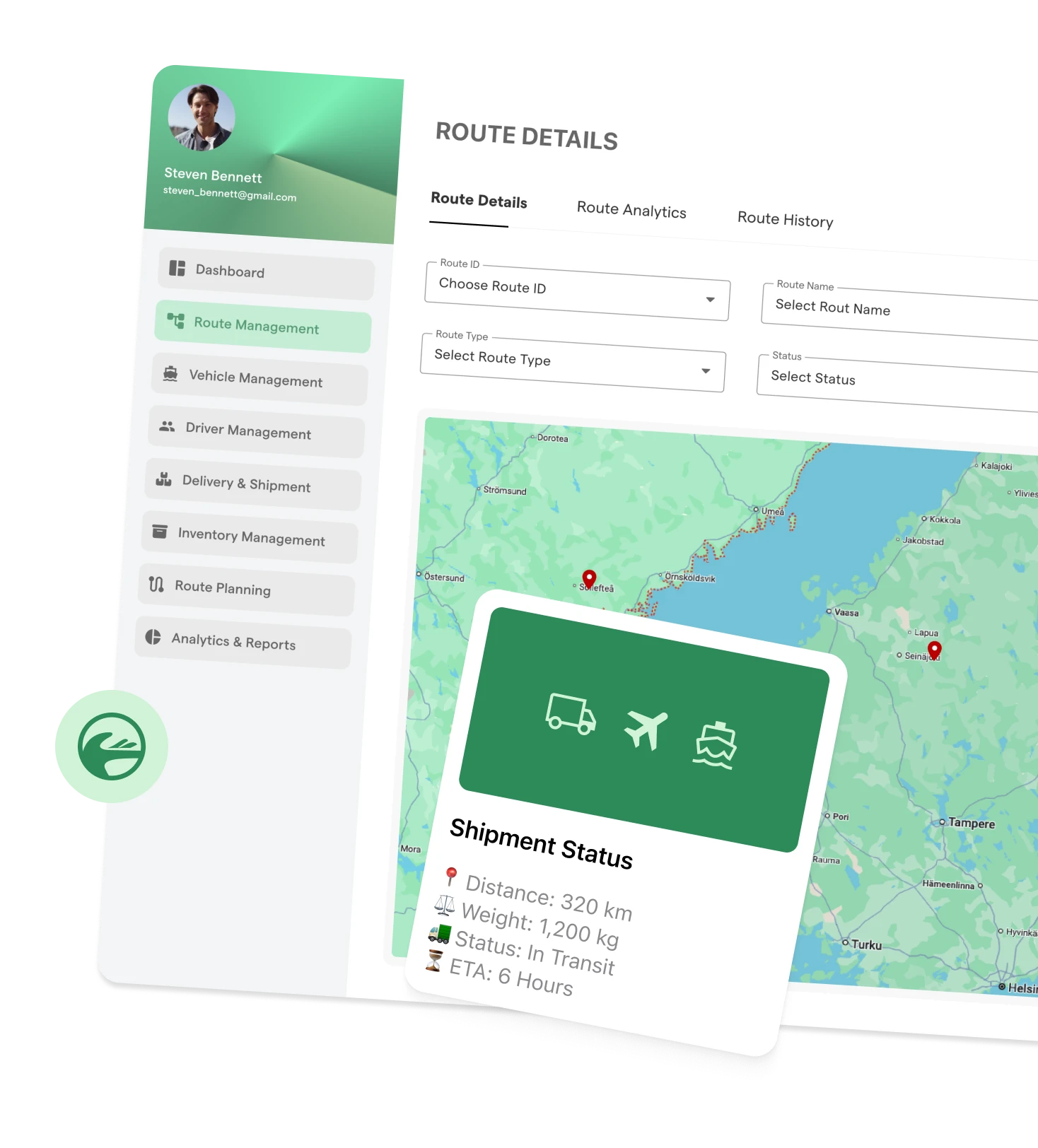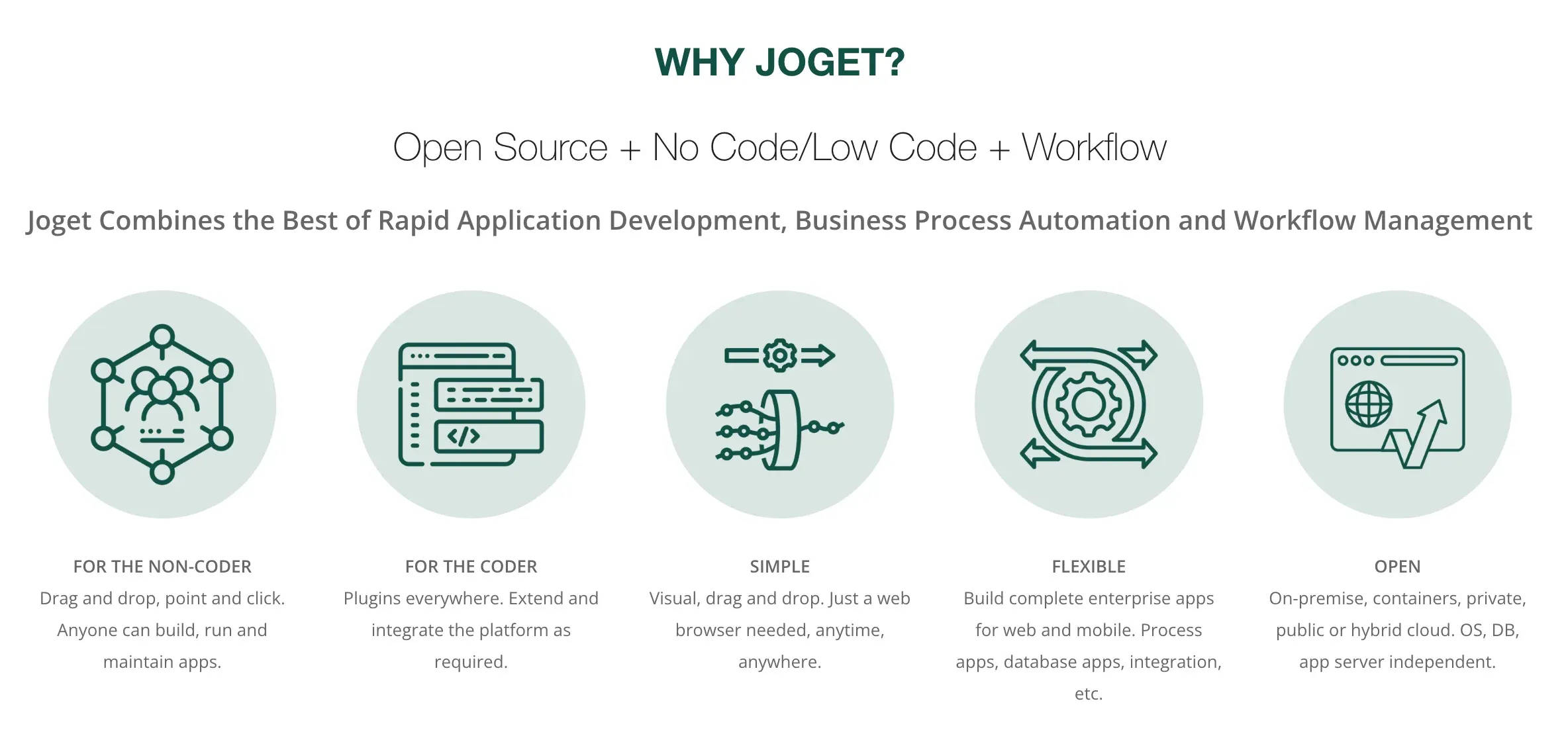- The Challenges of Traditional Application Development
- Joget: A Low Code Solution for Rapid Application Development
- How Joget Addresses Key Business Pain Points?
- Why Businesses Choose Joget Over Other No-Code Platforms
- Real-World Applications of Joget
- Why Choose AppsRhino for Your Joget Development Needs?
- Conclusion
- Frequently asked questions (FAQs)
Table of Contents
Why is Joget the Best Low Code App Development Platform?

In today’s fast-moving digital world, businesses must develop applications quickly to stay competitive. However, traditional coding methods often result in long development cycles, requiring specialized skills and significant time investments.
This challenge has led to the rise of low-code development platforms, which allow businesses to create applications faster with minimal coding knowledge.
One such platform that stands out is Joget, a comprehensive low-code app development solution designed to accelerate application development while maintaining flexibility and scalability.
This article explores how Joget empowers businesses by addressing key pain points and offering an efficient alternative to traditional coding.
The Challenges of Traditional Application Development
Before diving into how Joget solves business problems, let’s look at some common challenges with traditional development methods:
1. Long Development Cycles
Traditional application development can take months or even years due to complex coding requirements and lengthy testing phases.
Businesses struggle to keep up with fast-changing market demands.
2. High Development Costs
Hiring skilled joget developers, maintaining infrastructure, and continuous debugging lead to high operational costs.
Many small and mid-sized businesses cannot afford to develop custom applications from scratch.
3. Dependence on IT Teams
Non-technical business users rely heavily on IT departments for even minor changes, leading to bottlenecks.
Limited agility slows down innovation and decision-making.
4. Difficulty in Scaling Applications
Traditional applications often require significant redevelopment when businesses scale.
This increases costs and creates inefficiencies in growth-focused companies.
Joget: A Low Code Solution for Rapid Application Development

Joget is a low code app development, open-source platform that enables businesses to create and deploy applications with minimal coding.
Whether automating workflows, managing business processes, or developing enterprise applications, Joget simplifies the entire process.
Key Features of Joget
Below listed are the top key features of Joget system:
- Drag-and-Drop Application Builder: No coding expertise needed – users can create forms, workflows, and dashboards using a visual interface. Speeds up application development significantly.
- Workflow Automation: Businesses can automate approval processes, document management, and task assignments, improving operational efficiency. Reduces manual errors and increases productivity.
- Customization & Extensibility: While low-code platforms often have limitations, Joget allows developers to extend its capabilities using plugins, scripts, and APIs. Ensures that businesses don’t have to compromise on flexibility.
- Scalable and Cloud-Ready: Supports on-premise and cloud deployment, making it a great fit for businesses of all sizes. Easily scales as business needs grow.
- Cost-Effective Development: Reduces the need for expensive software development teams. Shorter development cycles mean faster time-to-market.
How Joget Addresses Key Business Pain Points?
In today’s fast-paced business landscape, companies need agile, cost-effective solutions to streamline operations and drive efficiency.
Traditional application development can be slow, expensive, and highly dependent on specialized developers. This is where Joget, a powerful no-code/low-code platform, comes in.

Joget system empowers businesses to build, customize, and deploy applications effortlessly without deep technical expertise. Whether you're a business owner, IT manager, or department head, Joget simplifies application development while reducing costs and improving collaboration.
Let’s explore how Joget directly addresses critical pain points businesses face today.
1. Accelerating the Development Process
Building business applications from scratch often requires months of development, rigorous testing, and constant iterations. This delays digital transformation and increases operational inefficiencies.
🚀 Drag-and-Drop Visual Builders
Joget provides an intuitive, drag-and-drop application builder that allows business users and IT teams to design applications quickly.
✔ No coding required – Business users can build apps visually without relying on developers.
✔ Rapid prototyping – Quickly test workflows and refine applications in real-time.
✔ Intuitive interface – A seamless design process that simplifies complex development.
With Joget system, businesses can reduce application development time from months to weeks, ensuring faster go-to-market solutions.
📦 Pre-Built Templates and Plugins
Joget’s extensive library of ready-made templates and plugins eliminates the need for development from scratch.
✔ Industry-specific templates – Start with pre-designed apps for HR, finance, CRM, and more.
✔ Extend functionality easily – Customize applications with plugins and integrations.
✔ Faster deployment – Launch solutions instantly with minimal configuration.
This means businesses can prototype, test, and deploy applications faster, accelerating growth and innovation.
2. Delivering Cost-Effective Solutions

Custom software development often comes with high licensing fees, expensive developer resources, and ongoing maintenance costs. Joget removes these financial barriers.
💡 Open-Source Platform – No Hefty Licensing Fees
Joget is an open-source Low code App development platform, allowing businesses to build applications without the burden of expensive licenses.
✔ Lower total cost of ownership (TCO) – Avoid recurring licensing fees.
✔ Scalable for any business size – Ideal for startups and enterprises alike.
✔ Community-driven improvements – Constant updates from a growing developer community.
By choosing Joget, companies eliminate vendor lock-in and reduce software expenses, making digital transformation accessible to all.
👨💻 Reduced Dependency on Specialized Developers
Joget's no-code/low-code approach allows non-technical employees to contribute to app development.
✔ Empowers business users – HR, finance, and operations teams can create their own workflows.
✔ Frees up IT resources – Developers focus on critical tasks rather than routine applications.
✔ Lower staffing costs – No need to hire a large development team.
By enabling internal teams to create applications, Joget cuts development costs and enhances productivity.
3. Ensuring Flexibility and Scalability
As businesses grow, they require scalable and customizable applications that evolve with their needs.
🔌 Extensible Plugin Architecture – Customize to Fit Business Needs
Joget provides a modular architecture where businesses can add custom plugins and features as required.
✔ Highly adaptable – Modify applications to meet industry-specific needs.
✔ Seamless third-party integrations – Connect with ERP, CRM, HRMS, and other tools.
✔ Future-proof technology – Extend functionalities without redeveloping from scratch.
This ensures businesses have a flexible, evolving platform that grows with their operations.
🌐 Seamless Integration with Business Systems
Joget integrates smoothly with existing software ecosystems, ensuring efficient data flow.
✔ Connects with cloud & on-premise apps – Salesforce, SAP, Slack, and more.
✔ API-driven approach – Easily link Joget with proprietary business tools.
✔ Reduces operational silos – Ensures teams work with unified data.
Joget’s integration capabilities allow businesses to scale without disrupting workflows, making it an ideal long-term solution.
Suggested Reading: Streamlining your Workflow with Joget: A Comprehensive Guide
4. Enhancing Collaboration Between Teams
Siloed teams and inefficient workflows hinder productivity and decision-making. Joget fosters a collaborative work environment.
👥 Empowering Citizen Developers – Democratizing App Development
Joget bridges the gap between IT and business teams, allowing non-technical users to create and manage applications.
✔ Empowers employees – Business users can automate workflows and processes.
✔ Breaks down communication barriers – Encourages collaboration between IT and departments.
✔ Fosters innovation – Teams can experiment with new solutions without heavy coding.
By enabling "citizen developers", Joget makes digital transformation a company-wide initiative.
📊 Streamlined Workflow Automation – Boosting Efficiency
Joget automates time-consuming, repetitive tasks, reducing errors and improving efficiency.
✔ Automated approvals & processes – Speeds up decision-making.
✔ Task assignments & notifications – Ensures smooth team coordination.
✔ Increased accuracy – Eliminates manual data entry errors.
With Joget system, teams can focus on strategic tasks instead of routine admin work, enhancing overall efficiency.
Why Businesses Choose Joget Over Other No-Code Platforms
Among the many available options, Joget stands out as a preferred choice for enterprises. But why do businesses choose Joget over other no-code platforms? Let’s explore.

User-Friendly Interface – Build Applications with Ease
One of the biggest pain points business owners face is the complexity of traditional software development.
Hiring a development team, managing code, and troubleshooting technical issues can be overwhelming. Joget eliminates these challenges with an intuitive, easy-to-use interface.
✅ Drag-and-Drop Visual Modeling
Joget’s drag-and-drop functionality enables users to design workflows, forms, and dashboards without writing code. This makes it easy for business users and non-technical teams to create and customize applications in minutes.
Example Use Case: A retail business can use Joget to build a custom order management system, reducing the dependency on third-party software and minimizing operational bottlenecks.
✅ Responsive Design for Any Device
Joget ensures that all applications built on its platform are optimized for desktop, tablet, and mobile devices.
This means businesses can provide employees and customers with seamless access to applications from anywhere, improving productivity and user experience.
Suggested Reading: Workflow Wonders: Collaborate with Talented Joget Developers
2. Robust Security Measures – Safeguard Business Data
Security is a major concern for businesses looking to digitize their operations. Without proper security protocols, businesses risk data breaches, compliance violations, and financial losses.
🔐 Compliance and Governance
Joget follows industry security standards and best practices, ensuring that applications built on its platform comply with data protection regulations such as GDPR and HIPAA.
Example Use Case: A healthcare provider can use Joget to develop a secure patient management system, ensuring sensitive medical records are encrypted and only accessible by authorized personnel.
🔐 Role-Based Access Control (RBAC)
With Joget’s role-based access control, businesses can define user permissions, restricting access to sensitive data based on user roles. This ensures that only authorized employees can view or edit specific information.
Example Use Case: A financial institution can use Joget to develop an internal loan approval system, ensuring that only senior managers can approve or review loan applications.
3. Comprehensive Support and Active Community – Never Feel Stuck

Many businesses hesitate to adopt new technology due to concerns about ongoing support and training. Joget system solves this issue by offering a strong support system and a vibrant community.
📌 Active Community Forums
Joget has an active community of developers, business users, and industry experts who collaborate and share best practices.
This allows users to get quick solutions to challenges and continuously improve their applications.
Example Use Case: A logistics company using Joget for fleet management automation can access forums to optimize workflows and improve operational efficiency.
📌 Extensive Documentation and Tutorials
Joget provides comprehensive documentation, video tutorials, and step-by-step guides to help businesses maximize their platform’s potential.
Example Use Case: A startup with limited technical resources can quickly learn to develop customer support chatbots or workflow automation tools by following Joget’s tutorials.
Feature | Joget | Traditional Development | Other No-Code Platforms |
| Ease of Use | ✅ Drag-and-drop interface | ❌ Requires coding expertise | ✅ Varies by platform |
| Cost | ✅ Low development cost | ❌ Expensive to hire developers | ✅ Affordable for most SMBs |
| Security | ✅ Compliance-ready | ❌ Security risks due to manual coding | ✅ Some platforms offer compliance |
| Community Support | ✅ Active forums & tutorials | ❌ Limited self-help resources | ✅ Varies by platform |
| Scalability | ✅ Supports enterprise growth | ❌ Requires frequent upgrades | ✅ Some platforms scale well |
Joget stands out because it combines no-code simplicity with enterprise-grade security and scalability.
Real-World Applications of Joget
Joget is a powerful low-code/no-code platform that enables businesses to build and automate applications quickly.
Its flexibility and scalability make it suitable for various industries and use cases.
Let’s explore some real-world applications of Joget across different sectors.
Case Study 1
Mokxa Technologies
Mokxa Technologies, a growing enterprise, faced the challenge of managing its rapid expansion.
As the company scaled, its existing processes became inefficient, leading to bottlenecks and operational delays.
Mokxa needed a solution that could streamline its enterprise processes while aligning with its agile mindset.
Solution
Joget provided the perfect platform for Mokxa to build enterprise capabilities incrementally. By developing modules one at a time, Mokxa was able to:
- Align development with business needs without disrupting ongoing operations.
- Scale efficiently as the company grew, ensuring that processes remained agile and adaptable.
- Reduce development time and costs by leveraging Joget low code platform.
This approach allowed Mokxa to manage its growth effectively while maintaining operational efficiency.
Key Takeaway: Joget’s modular development approach is ideal for businesses looking to scale without compromising agility.
Case Study 2
Allied Benefit Systems
Allied Benefit Systems, a leader in employee benefits administration, needed a robust project governance solution to manage its complex operations.
The lack of a tailored system was hindering their ability to track projects, allocate resources, and ensure timely delivery.
Solution
Joget enabled Allied Benefit Systems to develop a customized project governance solution tailored to their specific needs. The platform allowed them to:
- Streamline project management by creating a centralized system for tracking and reporting.
- Enhance efficiency by automating repetitive tasks and improving collaboration across teams.
- Adapt quickly to changing requirements, thanks to Joget’s flexible and user-friendly interface.
The result was a significant improvement in project management efficiency, enabling Allied Benefit Systems to deliver better outcomes for their clients.
Key Takeaway: Joget’s flexibility makes it a powerful tool for creating tailored solutions that address unique business challenges.
Why Choose AppsRhino for Your Joget Development Needs?

Now that you’ve seen the incredible benefits of using Joget as a low code development platform, you might be wondering how to get started.
While Joget is designed to be user-friendly, having expert developers by your side can make the process even smoother and more efficient.
This is where AppsRhino comes in.
Why Hire Joget Developers from AppsRhino?
AppsRhino is a trusted name in the world of low code development platform, specializing in Joget-based solutions. Here’s why you should consider hiring their team of expert Joget developers:
- Proven Expertise: AppsRhino’s developers have extensive experience in building scalable, customized solutions using Joget.
- End-to-End Support: From ideation to deployment, AppsRhino provides comprehensive support to ensure your project is a success.
- Cost-Effective Solutions: By leveraging their expertise, you can save time and resources while achieving your business goals.
- Quick Turnaround: AppsRhino’s agile development approach ensures faster delivery without compromising on quality.
Whether you need a simple workflow automation tool or a complex enterprise application, AppsRhino’s Joget development services can bring your vision to life.
Key Takeaway: Partnering with AppsRhino ensures that your Joget-based solutions are developed efficiently, effectively, and tailored to your unique business needs.
Conclusion
Joget stands out as a low code development platform that offers:
- Simplicity: No coding expertise required, making it accessible to non-technical users.
- Flexibility: Customizable to meet the unique needs of any business.
- Cost-Effectiveness: Reduces development time and costs, delivering a high ROI.
Whether you’re looking to streamline operations, manage growth, or improve project governance, Joget system provides the tools you need to succeed.
Why AppsRhino is Your Ideal Partner
While Joget is a powerful platform, having the right team to implement it can make all the difference. AppsRhino offers the expertise, support, and efficiency you need to maximize the potential of Joget for your business.
Ready to take your business to the next level? Visit AppsRhino’s website today to hire expert Joget developers and get started on your low code platform development journey.
Don’t let operational inefficiencies hold your business back. With Joget system and AppsRhino, you can build the solutions you need to thrive in a competitive landscape.
Frequently asked questions (FAQs)
What makes Joget System stand out among other low code development platforms?
Joget combines simplicity, flexibility, and cost-effectiveness, making it accessible to non-technical users while offering powerful customization options for complex business needs.
Can Joget handle enterprise-level applications?
Yes, Joget is designed to scale with your business, offering robust features like workflow automation, integration capabilities, and modular development for enterprise-grade solutions.
Is Joget suitable for non-technical users?
Absolutely! Joget’s intuitive drag-and-drop interface and visual design tools allow even non-developers to create and deploy applications quickly and efficiently.
How does Joget ensure cost-effectiveness?
By reducing development time, minimizing the need for extensive coding, and offering a low-code approach, Joget significantly lowers both initial and ongoing development costs.
Can I customize applications built on Joget?
Yes, Joget’s flexible platform allows for extensive customization, enabling businesses to tailor applications to their specific workflows and requirements
Table of Contents
- The Challenges of Traditional Application Development
- Joget: A Low Code Solution for Rapid Application Development
- How Joget Addresses Key Business Pain Points?
- Why Businesses Choose Joget Over Other No-Code Platforms
- Real-World Applications of Joget
- Why Choose AppsRhino for Your Joget Development Needs?
- Conclusion
- Frequently asked questions (FAQs)


